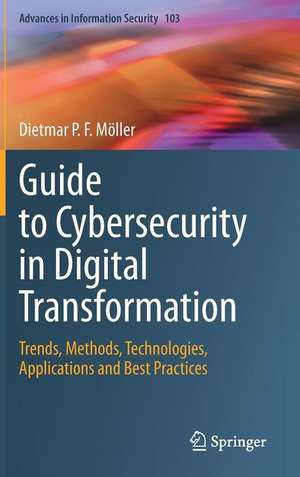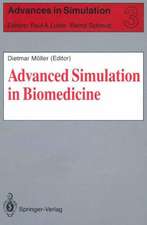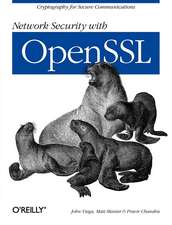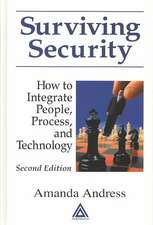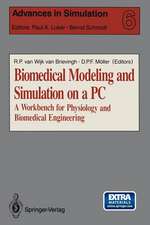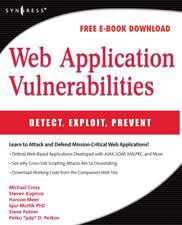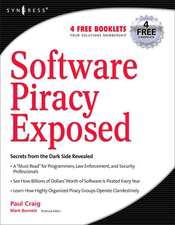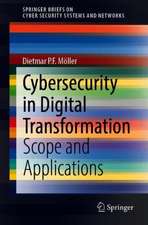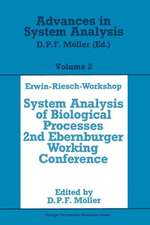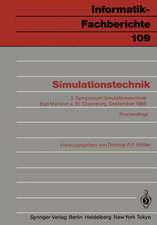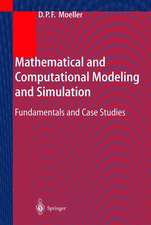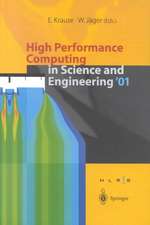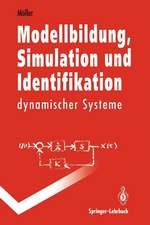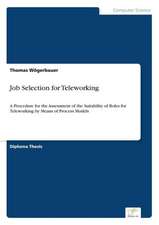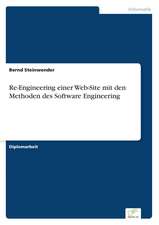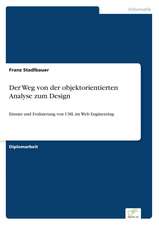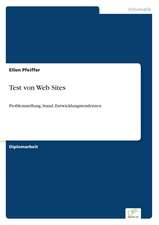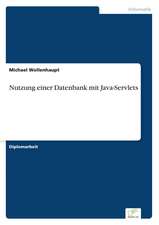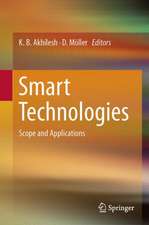Guide to Cybersecurity in Digital Transformation: Trends, Methods, Technologies, Applications and Best Practices: Advances in Information Security, cartea 103
Autor Dietmar P. F. Mölleren Limba Engleză Hardback – 19 apr 2023
Specifically, cybersecurity technologies, processes, and practices need to be generalized and applied to intrusion detection and prevention measures. This entails analyzing profiles of cyber-attackers and building cyber-attack models for behavior simulation that can effectively counter such attacks. This comprehensive volume aims to cover all essential aspects of cybersecurity in digital transformation and to provide a framework for considering the many objectives and requirements involved. In addition to introducing theoretical foundations, the work also offers practical techniques for defending against malicious cybercriminals.
Topics and features:
- Explores cybersecurity’s impact on the dynamics of interconnected, complex cyber- and physical systems, infrastructure resources, and networks
- Provides numerous examples of applications and best practices
- Considers methods that organizations can use to assess their cybersecurity awareness and/or strategy
- Describes anomaly intrusion detection, a key tool in thwarting both malware and theft (whether by insiders or external parties) of corporate data
- Addresses cyber-attacker profiles, cyber-attack models and simulation, cybersecurity ontology, access-control mechanisms, and policies for handling ransomware attacks
- Discusses the NIST Cybersecurity Framework, MITRE Adversarial Tactics, Techniques and Common Knowledge, CIS Critical Security Controls, and the ISA/IEC 62442 Cybersecurity Standard
Dietmar P. F. Möller, a retired full professor, is affiliated with the Institute for Mathematics at Clausthal University of Technology, Germany. He was an author of several other Springer titles, including Guide to Automotive Connectivity and Cybersecurity.
| Toate formatele și edițiile | Preț | Express |
|---|---|---|
| Paperback (1) | 372.60 lei 38-44 zile | |
| Springer Nature Switzerland – 20 apr 2024 | 372.60 lei 38-44 zile | |
| Hardback (1) | 545.13 lei 43-57 zile | |
| Springer Nature Switzerland – 19 apr 2023 | 545.13 lei 43-57 zile |
Din seria Advances in Information Security
- 20%
 Preț: 997.96 lei
Preț: 997.96 lei - 20%
 Preț: 647.28 lei
Preț: 647.28 lei - 20%
 Preț: 901.82 lei
Preț: 901.82 lei - 20%
 Preț: 1165.69 lei
Preț: 1165.69 lei - 20%
 Preț: 866.27 lei
Preț: 866.27 lei - 20%
 Preț: 935.19 lei
Preț: 935.19 lei - 20%
 Preț: 638.69 lei
Preț: 638.69 lei - 15%
 Preț: 637.28 lei
Preț: 637.28 lei - 20%
 Preț: 647.79 lei
Preț: 647.79 lei - 20%
 Preț: 1152.15 lei
Preț: 1152.15 lei - 24%
 Preț: 833.48 lei
Preț: 833.48 lei - 20%
 Preț: 1050.67 lei
Preț: 1050.67 lei - 18%
 Preț: 1674.82 lei
Preț: 1674.82 lei - 20%
 Preț: 933.57 lei
Preț: 933.57 lei - 20%
 Preț: 1171.94 lei
Preț: 1171.94 lei - 20%
 Preț: 931.51 lei
Preț: 931.51 lei - 18%
 Preț: 949.10 lei
Preț: 949.10 lei - 20%
 Preț: 995.75 lei
Preț: 995.75 lei - 20%
 Preț: 644.66 lei
Preț: 644.66 lei - 20%
 Preț: 643.30 lei
Preț: 643.30 lei - 15%
 Preț: 641.20 lei
Preț: 641.20 lei - 20%
 Preț: 647.61 lei
Preț: 647.61 lei - 20%
 Preț: 648.11 lei
Preț: 648.11 lei - 20%
 Preț: 652.54 lei
Preț: 652.54 lei - 20%
 Preț: 642.98 lei
Preț: 642.98 lei - 20%
 Preț: 640.35 lei
Preț: 640.35 lei - 15%
 Preț: 639.59 lei
Preț: 639.59 lei - 15%
 Preț: 637.46 lei
Preț: 637.46 lei - 20%
 Preț: 820.50 lei
Preț: 820.50 lei - 18%
 Preț: 1219.01 lei
Preț: 1219.01 lei
Preț: 545.13 lei
Preț vechi: 681.41 lei
-20% Nou
Puncte Express: 818
Preț estimativ în valută:
104.34€ • 113.38$ • 87.71£
104.34€ • 113.38$ • 87.71£
Carte tipărită la comandă
Livrare economică 21 aprilie-05 mai
Preluare comenzi: 021 569.72.76
Specificații
ISBN-13: 9783031268441
ISBN-10: 303126844X
Pagini: 420
Ilustrații: XVIII, 420 p. 1 illus.
Dimensiuni: 155 x 235 mm
Greutate: 0.79 kg
Ediția:2023
Editura: Springer Nature Switzerland
Colecția Springer
Seria Advances in Information Security
Locul publicării:Cham, Switzerland
ISBN-10: 303126844X
Pagini: 420
Ilustrații: XVIII, 420 p. 1 illus.
Dimensiuni: 155 x 235 mm
Greutate: 0.79 kg
Ediția:2023
Editura: Springer Nature Switzerland
Colecția Springer
Seria Advances in Information Security
Locul publicării:Cham, Switzerland
Cuprins
Foreword.- Preface.- 1 Cybersecurity in Digital Transformation.- 2 Threats and Threat Intelligence.- 3 Intrusion Detection and Prevention.- 4 Cyber-Attacker Profiles, Cyber-Attack Models and Scenarios, and Cybersecurity Ontology.- 5 NIST Cybersecurity Framework and MITRE Cybersecurity Criteria.- 6 Ransomware Attacks and Scenarios: Cost Factors and Loss of Reputation.- 7 Cybersecurity Maturity Models and SWOT Analysis.- 8 Machine Learning and Deep Learning.- Glossary.- Index.
Notă biografică
Prof. Dr. Dietmar P. F. Möller is a professor at Clausthal University of Technology (TUC) and actually teaching at the Clausthal Executive School of TUC in the International Leadership and Technology (ILaT) program. His teaching include courses in Cyber-Physical Systems, Cybersecurity in Digital Transformation, Internet of Things and Industrial Internet of Things, and Intelligent Manufacturing and Industry 4.0. He also is an Adjunct Professor of the University of Nebraska-Lincoln (U.S.A.) at the EE & ECE Department, and an Adjunct Professor at The University of Alabama in Huntsville, at the EE & ECE Department (U.S.A.). The current research topics of Professor Möller are Cyber-Physical Systems, Cybersecurity in Digital Transformation, Intelligent Manufacturing and Industry 4.0. Prof. Möller has published several books with Springer, whereby one of which has also been translated from English into Chinese language (D.P.F.Möller: Guide to Computing Fundamentals in Cyber-Physical Systems - Concepts, Design Methods, and Applications), and one from English into Korean language (D.P.F.Möller, R.E.Haas: Guide to Automotive Connectivity and Cybersecurity _ Trends, Technolgies, Innovations and Applications).
Textul de pe ultima copertă
In today’s digital transformation environments, a rigorous cybersecurity approach to effective risk management — including contingency planning, outlining immediate actions, preparing post-breach response — is central to defending organizations’ interconnected computer systems, networks, and infrastructure resources from malicious cyber-attacks.
Specifically, cybersecurity technologies, processes, and practices need to be generalized and applied to intrusion detection and prevention measures. This entails analyzing profiles of cyber-attackers and building cyber-attack models for behavior simulation that can effectively counter such attacks. This comprehensive volume aims to cover all essential aspects of cybersecurity in digital transformation and to provide a framework for considering the many objectives and requirements involved. In addition to introducing theoretical foundations, the work also offers practical techniques for defending against malicious cybercriminals.
Topics and features:
Specifically, cybersecurity technologies, processes, and practices need to be generalized and applied to intrusion detection and prevention measures. This entails analyzing profiles of cyber-attackers and building cyber-attack models for behavior simulation that can effectively counter such attacks. This comprehensive volume aims to cover all essential aspects of cybersecurity in digital transformation and to provide a framework for considering the many objectives and requirements involved. In addition to introducing theoretical foundations, the work also offers practical techniques for defending against malicious cybercriminals.
Topics and features:
- Explores cybersecurity’s impact on the dynamics of interconnected, complex cyber- and physical systems, infrastructure resources, and networks
- Provides numerous examples of applications and best practices
- Considers methods that organizations can use to assess their cybersecurity awareness and/or strategy
- Describes anomaly intrusion detection, a key tool in thwarting both malware and theft (whether by insiders or external parties) of corporate data
- Addresses cyber-attacker profiles, cyber-attack models and simulation, cybersecurity ontology, access-control mechanisms, and policies for handling ransomware attacks
- Discusses the NIST Cybersecurity Framework, MITRE Adversarial Tactics, Techniques and Common Knowledge, CIS Critical Security Controls, and the ISA/IEC 62442 Cybersecurity Standard
Caracteristici
Offers a comprehensive view of cybersecurity in digital transformation Shows how to efficiently detect and defend threat events to overcome the cybersecurity risks Examines the Cybersecurity maturity level
